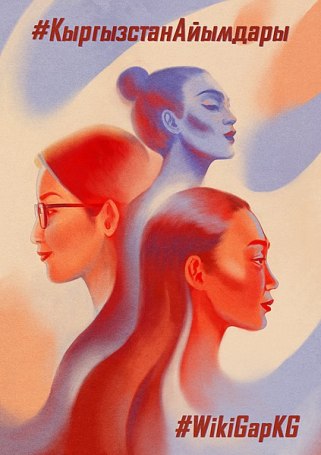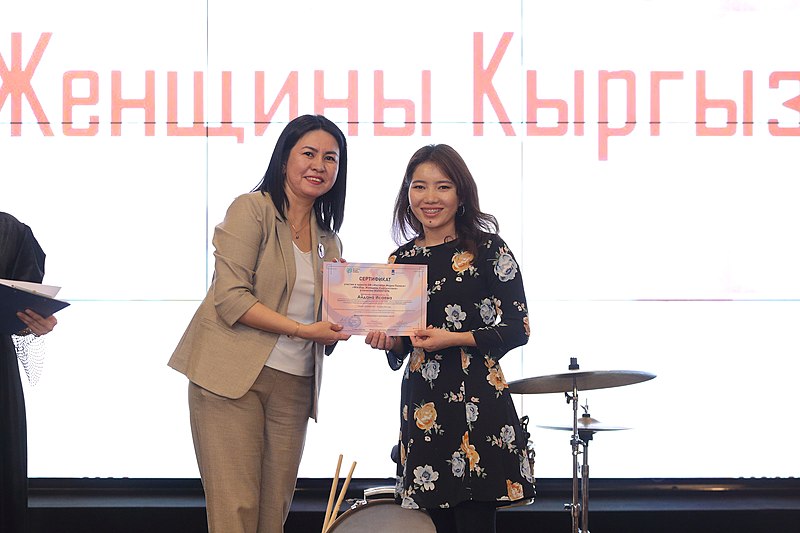Volunteers have contributed to the Kyrgyz language Wikipedia by adding and editing information about 100 women of Kyrgyzstan.
The overall theme of WikiGap is closing the gender gap and other gaps relevant for diversity on Wikipedia. The aim of this project was to bridge the gap in information about the achievements of Kyrgyz women in the Kyrgyz language Wikipedia as well as promote gender equality by raising awareness about women who have contributed significantly to various spheres such as politics, culture, sports, journalism, and diplomacy among others.
This project was implemented by Media Policy Institute – an independent non-profit organization with the financial support of the Embassy of the Netherlands in Kyrgyzstan. WikiGap Women of Kyrgyzstan 2022 project was coordinated by Ainura Yeshenalieva of the Media Policy Institute. The work of the volunteers was supervised by Aigul Omurkanova, Ph.D., Associate Professor of the Department of International Journalism at Kyrgyz-Russian Slavic University and Aliya Alisheva, Ph.D., Acting Associate Professor of Civil and family Law at the Kyrgyz State Law University.

From November 2021 until March 2022, 30 volunteers out of 100 that were selected through a competition, added new names to the Kyrgyz-language Wikipedia and updated the already available information about women of Kyrgyzstan. In March 2022 Media Policy Institute held the final presentation of the WikiGap. Women of Kyrgyzstan project and presented certificates to the volunteers.

Here you can find more photos from the final presentation of the project.
“Most of the volunteers are girls; it is important to highlight that in the process of writing about other women, they also got inspired. They not only want to continue editing Wikipedia, but also want to be like these prominent women whom we wrote about” – said coordinator of the project Ainura Yeshenalieva in her conversation on Вечер Трудного дня.
To the question of why 30 volunteers were selected to participate in this project, Aynura Yeshenalieva said: “When assessing the applications, we looked at their writing and analytical skills. Initially we invited about 40 participants to our trainings, some dropped out. Thirty volunteers continued working with supervisors and consultants. Our consultants organized trainings both online and offline. Some of the main topics were on how to create an article on Wikipedia, how to find reliable sources of information, and how to work with photos”.
One of the supervisors, Aigul Omurkanova, said that “there are not many photos on Commons from Kyrgyzstan and many articles about women were left without photos. The author of the photo needs to upload it themselves. I want to remind people, if you have photos from your trips in Kyrgyzstan, please do share them on Commons”.
Earlier in 2019, a similar project was implemented in the neighboring country Kazakhstan.
“I’m not a magician, I’m just learning. When it comes to the quality of the Kyrgyz-language Wikipedia, it’s not just about adding articles and applauding each other and celebrating how good we are. Professional editing and continuous feedback on how things should have been done better to improve the quality is also vital. The Kyrgyz-language Wikipedia is still lagging behind in this regard” – highlighted Aigul Omurkanova in her speech.
The list of added information about women in the frame of WikiGap project can be found on the Kyrgyz Wikipedia.
Here you can find out more about WikiGap and check this link to join the WikiGap2022 Challenge to support strengthen the Wikipedia’s coverage of women and related topics into as many languages as possible.

Can you help us translate this article?
In order for this article to reach as many people as possible we would like your help. Can you translate this article to get the message out?
Start translation